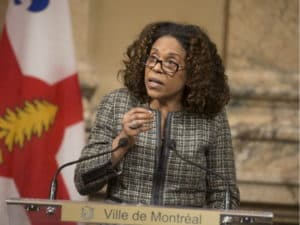Committee on Diversity Says Montreal Must Change Hiring Practices Now
Michelle Lalonde, Montreal Gazette, May 16, 2019
The city of Montreal needs to work much harder and faster to make its workforce reflect the city’s true diversity, and that means setting clear targets and holding upper management responsible for meeting them, says a report issued this week by the Advisory Committee on Diversity, Inclusion and Anti-discrimination.
Mayor Valérie Plante announced the 15-member advisory committee last spring, and gave it one year to come up with an action plan on how the city can accelerate efforts to make its workforce better reflect the population, 30 per cent of which come from “diverse” backgrounds (visible minorities, indigenous, people with disabilities, LGBTQ, etc.).
The report’s first recommendation is that the mayor make a formal declaration that the city will set clear hiring targets for minorities in order to make its workforce reflect the population in terms of diversity by 2022.
Other recommendations:
- that managers and directors of services be held responsible for attaining diversity results and targets
- that the city’s unions consider the possibility of suspending seniority provisions in order to allow employees who are members of under-represented groups — visible minorities, indigenous, and disabled workers for example — a chance to apply for promotion to management positions
- that city recruitment officers tour high schools, CEGEPs and community organizations in neighbourhoods with diverse populations to advertise summer jobs and career possibilities at the city
- that hiring committees include members of the under-represented groups
- that the city adopt better mechanisms to treat complaints of racist, xenophobic or sexual harassment in the workplace
- that anti-racism training be obligatory for city managers.
“I and my colleagues on the advisory committee believe that Montreal’s administration must push its limits and commit to going further,” said Myrlande Pierre, chairperson of the advisory committee on diversity, inclusion and the struggle against discrimination.
“Just and equitable representation in the workplace requires a strong and consistent commitment by senior management and on the political level. The city has to make significant changes … to make its workplace more representative of the Montreal population, particularly in management, executive and senior management positions.”

Myrlande Pierre
The report includes numbers that starkly illustrate the slow progress of minorities in the city’s employ, a growth that has been glacial to non-existent over the past five years.
Visible minorities made up 10.72 per cent of the workforce in 2013, and 13.8 per cent in 2018. (According to the 2016 census, visible minorities make up more than 22 per cent of the population in the Montreal census metropolitan area.)
Women held 38.1 per cent of city jobs five years ago; and 38.69 in 2018. People with disabilities slipped from 1.35 per cent of the workforce in 2013 to 1.01 per cent in 2018.
In management ranks, the picture was even more bleak. Only 83 of 1,700 managers, 4.8 per cent, were members of a visible minority group in 2013. By 2018, the city had 138 visible minorities among its 1,766 managers, or 7.81 per cent.
Among senior executives, women have been making strides. Women held 29.21 per cent of senior executive positions at the city in 2013, and 41.26 by 2018. But members of visible minorities slipped from 3.93 per cent of those posts in 2013 to 1.94 per cent in 2018. There were no indigenous and only two disabled senior executives in 2018.
The report concludes that to improve the situation in a reasonable timeframe, “it may be necessary to attack the current forces of inertia and resistance. This is why the committee supports the idea that coercive measures and incentives be put in place. … Otherwise this situation of a lack of representation at the city of Montreal will continue indefinitely.”
While speeches about equality and diversity are “omnipresent” at city hall, a “lack of commitment and leadership at the highest levels of the administrative apparatus over the years has thwarted and slowed progress in this area,” the report concludes.
Magda Popeanu, vice-president of the city’s executive committee responsible for culture and diversity issues, said the administration is studying the report.
Meanwhile, an independent commission that looks into complaints filed by those seeking jobs or promotions with the city filed its annual report on Tuesday. The public service commission of Montreal received 47 complaints in 2018, and upheld none.
Commission chairperson Julie Pepin said that result does not necessarily mean that all is well with city hiring practices. She said the commission, which has existed since 1944, has work to do in terms of making people aware of its existence and role.
She expressed concerned about the fact that almost a quarter of the people who filed a complaint withdrew it for various reasons, including that they feared reprisals, such as not being considered for a subsequent job opening or promotion.
“In 2016, the city changed our bylaw so that now we can’t receive anonymous complaints anymore,” Pepin said in an interview. “We think it is important that the bylaw be amended to give us the power to hear complaints by people who wish to remain anonymous.”















